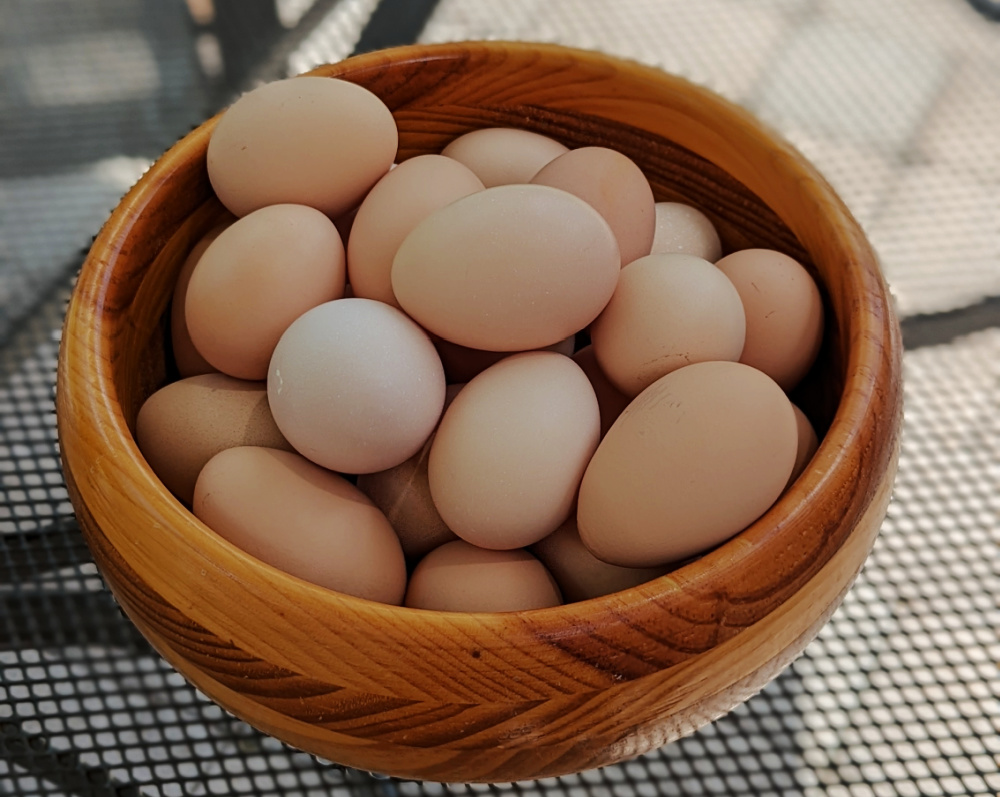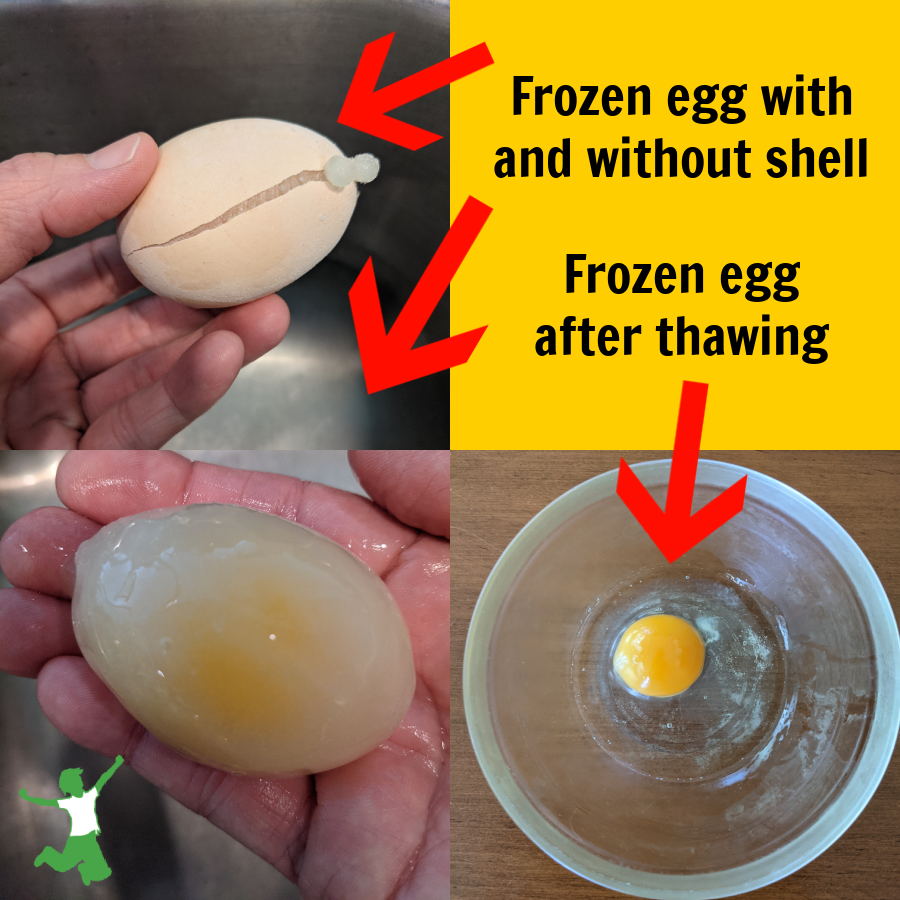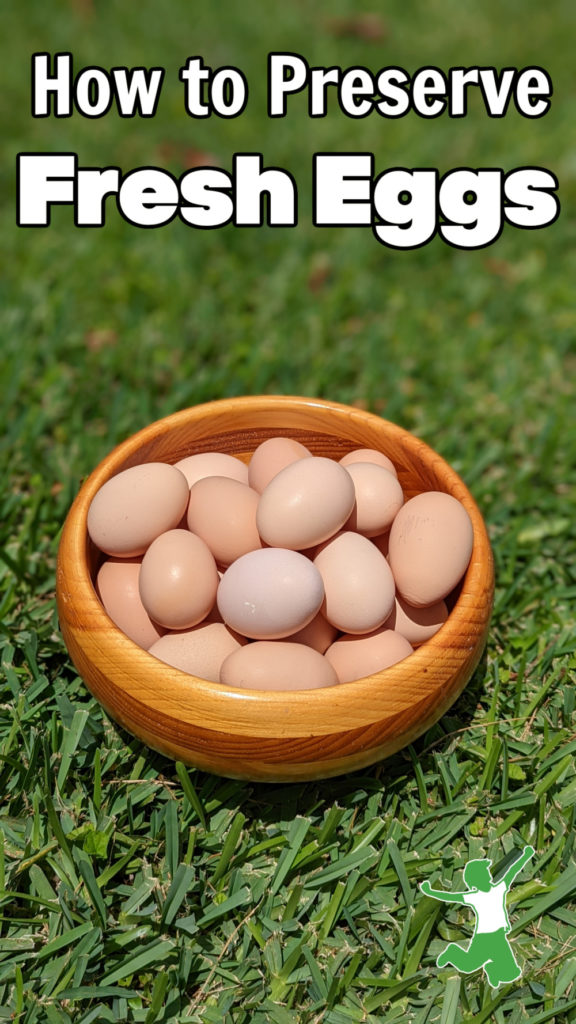Table of Contents[Hide][Show]
The best methods for preserving and storing fresh eggs in the refrigerator or freezer for use a few weeks, months, or even a year later.

Spring and summer are the times of year when backyard hens are typically at their peak egg production.
Things start to slow down in the autumn months to the point where the girls usually stop laying, molting and resting for an average of three months.
You can keep them laying year round by putting a 24/7 light in their coop. However, I don’t do this because it is highly unnatural and cruel. It also shortens their lifespan tremendously.
Thus, when chickens are at their peak productivity, you may find an overabundance of eggs that you can’t use up right away.
We have a practice of giving eggs away to neighbors and friends who would enjoy them. However, we are fortunate to still have plenty to store for use when egg production is low.
I thought I would share with you my three main methods for preserving eggs whether you have the luxury of your own little flock or buy at the farmer’s market and health food store.
Refrigerate
Preservation timeframe: up to 3 months
Fresh eggs have a protective layer called a bloom or cuticle on the outside of the shell.
This translucent coating very effectively seals off the pores of the shell.
This natural protection prevents bacteria from getting inside. It also reduces moisture loss, which preserves freshness.
These characteristics allow for safe storage on the counter without refrigeration.
This natural protection also means that if you have fresh eggs that need to be preserved longer than a week or two, you can simply put them in a bowl and refrigerate.
No washing is necessary if they are clean without any debris right out of the coop.
Note that commercial eggs do not have this protective cuticle.
Sadly, factory processing washes it away with toxic solutions before packaging. Even organic eggs are exposed to a chemicalized bath as chlorine is permitted for use by USDA standards.
This is why commercial eggs do not last months in the refrigerator like fresh eggs do.
Wash, Seal and Refrigerate
Preservation Timeframe: up to 3 months
Occasionally, eggs will have dirt or debris on them coming out of the coop.
This is commonly due to hens getting mud on their feet during wet weather. Another cause is a delay in freshening up the coop bedding which can increase manure exposure.
In this situation, the eggs should be washed in mild soap and warm water.
Unfortunately, the necessity of cleaning them also removes the protective bloom.
The good news is that there is a way to compensate.
After washing and drying, simply coat each egg with a small amount of extra virgin olive oil. Then, wipe away the excess with a clean cotton towel.
The oil will seal the shell’s pores in a manner similar to the protective cuticle. These sealed eggs will last in the refrigerator for around the same length of time as refrigerated fresh eggs that still have the bloom on them.
You can also use this method for eggs you purchase that have already been washed.
I suggest re-washing yourself with mild soap and filtered water before applying the protective oil coating. This prevents sealing in the chemicals the eggs were exposed to during the mandated cleaning at the factory.
How to Freeze Fresh Eggs
Preservation Timeframe: 3 months – 1 year
Most people do not realize that you can freeze fresh eggs with the shell!
Some websites suggest cracking the eggs, blending the yolk and white together, and then freezing individual eggs in ice cube trays.
That is a lot of unnecessary work!
Why would you ever remove the shell, the best protection for the edible portion there is?
If you have fresh eggs with the bloom intact, all you have to do is put them in a heavy-duty bag and place them in the freezer.
That. Is. It.
If you have farmer’s market eggs or eggs from your backyard flock that are washed, then seal with a film of EVOO as described above and then freeze.
The shell may or may not crack in the freezer. It doesn’t matter either way.
Surprisingly, the inside of the egg freezes before the shell cracks!

Thawing a Frozen Egg
When you need to use a frozen egg from the freezer, simply remove the shell first after letting the egg sit on the counter for a few minutes.
If the frozen egg already has a big crack, peeling the shell is a bit easier.
You will have an intact egg white and yolk that is still frozen after removing the shell as you can see from the above picture.
Place peeled frozen eggs without the shell in a bowl and leave in the refrigerator for a few hours.
Once thawed, they will be in a similar state as before freezing and ready to use.
Note: there is some texture loss similar to what happens to cream when you freeze and thaw fresh grassfed milk.
What about Water Glassing?
I do not suggest water glassing of fresh eggs as commonly recommended on homesteader websites.
The reason is that the pickling lime that is used is so caustic.
I am currently testing another method that is similar to water glassing but uses a safe and nontoxic substance.
Stay tuned for my results! This method can potentially preserve the egg texture better than freezing for long term storage.









I did not have a good experience with this. I froze 4 dozen and so far, of the 4 I’ve tried, the yoke is all rubbery. I tried using 1 in a recipe that called for eggs, hoping it would blend up, but it was just all chunky. Then I thought that maybe they would scramble just fine, but I couldn’t tolerate the texture, I threw them out. It’s almost like a soft boiled egg, but rubbery. I’m SO disappointed.
Yes, the texture is a bit different similar to what happens with the cream when you freeze raw milk. It doesn’t thaw out perfectly smooth, unfortunately and can be a bit grainy.
Let me add that I am testing another method for storage that is similar to water glassing. It should hopefully keep the texture better. I’ve never liked water glassing mostly because of the pickling lime which is so caustic. In the meantime, perhaps using those frozen eggs as boiled eggs would be best?
what about water glassing?
Yes, this is a traditional method before freezers were commonly available. You can only use this method for unwashed eggs. So, not an option for those who buy at the store or farmer’s markets (some farms wash them). I prefer freezing as it is more convenient to me and doesn’t involve glass jars.
So can I just leave the eggs in cartons instead of a bag like you mentioned, seems more protective? Same with the fridge I leave them in the carton? I assume your using a bowl cause you have chickens , whereas I have to purchase mine from a farm ? Thanks so much
Cartons aren’t sealed to keep the air out in the freezer. A sealed container would work.
Fascinating. Could you explain the necessity of washing off any debris before refrigerating or freezing? I would assume you would wash that debris off once you go about using eggs and you say washing removes the bloom so why do you need to bother cleaning a dirty egg until using it?
It’s just good hygiene to me … I don’t like to put them in my refrigerator or freezer that way.
Great post, thank you!
I wonder if you have heard of water glassing eggs using pickling lime and what your thoughts are on it. I’m thinking for the sake of saving freezer space and/or in case of power outages.
Jessica on Three River’s Homestead does this and loves it, check her out on YouTube
this is great, I can only eat duck eggs which are NOT available year round, so I can stock up and eat when the ducks aren’t laying!
Thank you for sharing this as I had no idea we could freeze eggs! Any reason you use EVOO specifically? Do you think coconut oil would work as well to coat the egg after washing it?
Yes you can use coconut oil, but it hardens in the fridge. I like EVOO as it stays liquid. If you are going to freeze them, it doesn’t matter.
Sarah…you’re a wealth of practical information! Thanks so much….I’ll be using these tips!
We had ducks for a while. We didn’t realize they were laying during the winter in a couple of different places around our property. In the very cold weather, 17°, we found a whole slew of eggs!!. They were totally frozen, but I brought them inside and had no qualms about using them after they’d thawed in my fridge ?
That is a very interesting story! Thank you for sharing 🙂
Thank you for these tips! I hope to start having my own chickens and look forward to trying this.